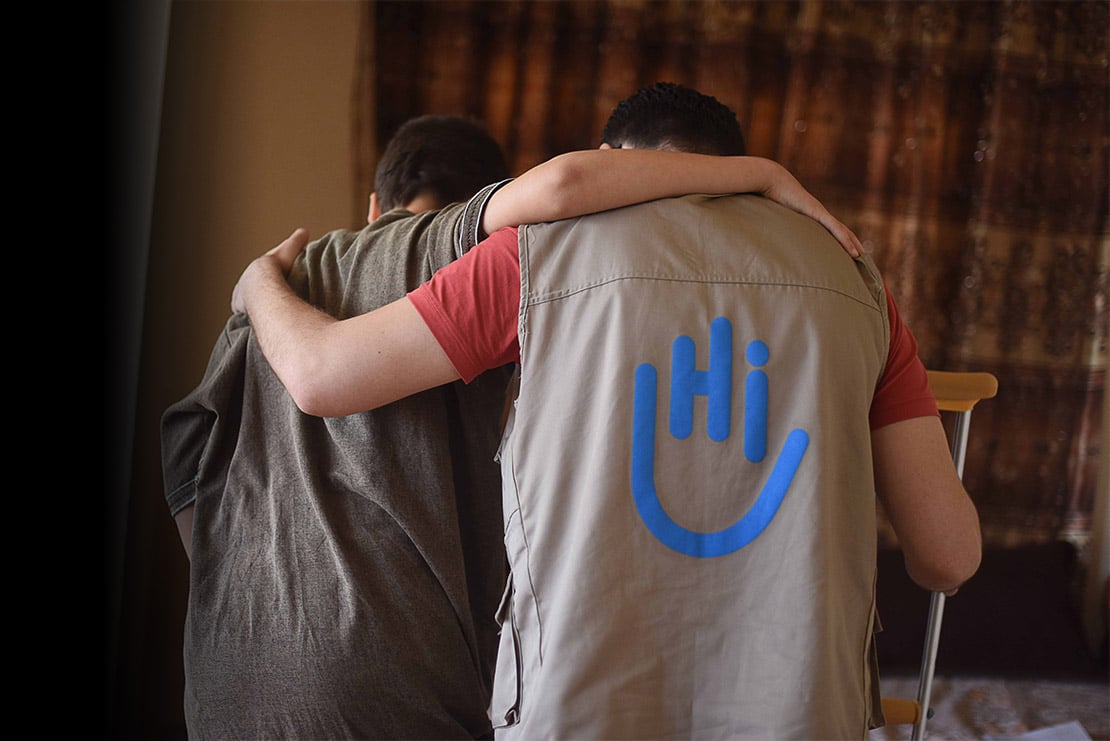EYEWITNESS
The psychological impact of the war in Ukraine
by photojournalist Tom Nicholson
EYEWITNESS
The psychological impact of the war in Ukraine
Photography by Tom Nicholson, October 2023.
As the conflict continues in Ukraine, people are struggling with the long term mental health impact of the violence. Photojournalist Tom Nicholson travelled to Dnipro to document the stories of people being supported by Humanity & Inclusion's teams.
Our global impact
2.5 million
Our actions directly supported 2.5 million people in 2022
60
We provide life-changing support in 60 countries
466
We run 466 projects worldwide




Co-winner of the Nobel Peace Prize 1997
for our work towards banning and clearing anti-personnel landmines
Sign up to receive updates
on how your support is changing lives
In Tsarychanka, a small town 80 km northwest of Dnipro, people affected by the conflict are trying to rebuild their lives. The town has received 1,700 internally displaced people (IDPs) since February 2022. With a population of just over 7,000 before the war, those who chose to stay are dealing with a quieter, longer term crisis.
Olena Sulzuyk
Olena Sulzuyk, 56, is an artist, a journalist and musician, not to mention a foundation of the village community. She takes part in HI’s mental health and psychosocial support sessions in Tsarychanka to help people cope with living through the conflict.
Olena says: "[It’s a] war on everyone. Therefore, people need psychological relief, positive emotions, psychological support, so as not to go crazy from the war, because life goes on.”
“Now, a bloody war is going on in Ukraine. People suffer every day from anxieties, worries, rocket attacks and destruction… everyone is suffering - both those who are under occupation and those who are in relative peace.”
Today, the theme of the session is ‘Autumn’, allowing participants to explore their emotions associated with the changing of the seasons.
Olena shares a poem about “optimism and love for life” during autumn. One part reads:
“Coupled with insomnia, the nights become more frequent
And for no reason - tearful eyes
No longer a cuckoo - a magpie chirps
And a stubborn soul does not want to believe in autumn.”
Yevhen Loik
Yevhen, 48 has cerebral palsy. He had to flee his hometown with his wife when the invasion of Ukraine began in February 2022.
Shortly after the move, Yevhen found out his wife had cancer and they both went to live with his parents Volodymyr and Vira who had flee to Tsarychanka.
Yevhen’s wife sadly died in October 2022.
Yevhen and his parents participate in HI’s mental health sessions. They describe the experience as, “like food for the soul to meet people who are going through the same experiences, fleeing from the war.”
Olha Vetkova and Volodymyr Vetkov
Olha, 32, and her husband Volodymyr, 49 have 7 children. Olha is pregnant with their eight child.
In 2021, the family bought a house, 9km away from what became a frontline in the war in 2022. Three weeks after the invasion in February 2022, Volodymyr piled his family into their car, and drove them to an Internally Displaced Person's (IDP) camp near Dnipro. They now live in a one bedroom house in Babaikiv.
“I hope for peace for my country and peace for my children.”
War has left some scars on their children, especially their five year old son who screams and becomes hysterical when he hears the sound of any aircraft. As the children are getting older, Volodymyr feels the need for at least one room for the boys, and another for the girls, and particularly for their daughter Olena, who has Cerebral Palsy. She loves drawing and studying.
Antonina Kolytova
Antonina, 68, is from Vuhledar a city right on the front line of the conflict in Ukraine. She is now an internally displaced person with her husband. Antonina has cancer and suffered a stroke. She receives chemotherapy and struggles with mobility. HI’s physiotherapist Maria supports her and shows her some strength training exercises that Antonina can practise at home.
Serhii Zinovatyi
Serhii, 36, is from Avdiivka, Ukraine, and now lives in an IDP camp in Pavlohrad, Ukraine. He and his mother have already lived through more than 10 years of war. Serhii used to be a chef, but on 30 January 2016, a grad rocket landed near Serhii in his hometown of Avdiivka, causing him life-changing injuries.
Initially, the doctors said Serhii wouldn’t be able to walk, but after a lot of training and physio, he can now walk with a mobility assistance device. Rostyslav, one of HI’s physiotherapists helps with his physical rehabilitation and also provides psychological support.
Life in the IDP camp is isolating. Serhii doesn’t have many friends, but his mother lives in the next village, and visits him every day.
Irena Strelets
Many healthcare professionals in Ukraine are reporting symptoms of burn-out, including depression, apathy, hopelessness, and loss of meaning in life and work. Irena Strelets, one of HI’s psychologists, leads stress resistance training for these healthcare professionals.
Irena teaches support staff how to manage their own cumulative stress as a result of high workload, psychological pressure and post-traumatic stress disorder.
Find out more about our emergency response in Ukraine and how you can help.
ABOUT US
Humanity & Inclusion UK
9 Rushworth Street
London
SE1 0RB
UK registered charity no. 1082565




MORE INFORMATION
SEARCH



